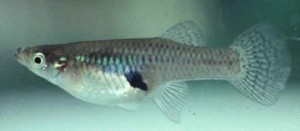Invasive species have major ecological, cultural, and economic implications and aquatic environments are particularly susceptible to invasive species. We transport organisms across the globe when we ship freight between countries. At each port where a ship stops it takes on and discharges water to maintain its position in the water as cargo is unloaded and loaded. For example, trade between the Black and Caspian Sea with companies in the Great Lakes region have introduced round gobies and zebra mussels, which outcompete natives and cost the region millions of dollars (e.g., the zebra mussels clog pipes, costing millions in cleaning and repair).
 While ballast water introductions are typically accidental, aquatic systems suffer from plenty of intentional introductions as well. For example, mosquitofish (which eat mosquito larvae) are introduced to control mosquito populations. While this fish does a great job of controlling mosquito populations (the state of California even breeds them and provides them to citizens at no charge), it easily establishes populations in its introduced ranges and has massive impacts on the native community. It has invaded over 40 countries and is listed as one of the top 100 worst invasive species worldwide.
While ballast water introductions are typically accidental, aquatic systems suffer from plenty of intentional introductions as well. For example, mosquitofish (which eat mosquito larvae) are introduced to control mosquito populations. While this fish does a great job of controlling mosquito populations (the state of California even breeds them and provides them to citizens at no charge), it easily establishes populations in its introduced ranges and has massive impacts on the native community. It has invaded over 40 countries and is listed as one of the top 100 worst invasive species worldwide.
Trying to understand how mosquitofish establish new populations and disperse to regions outside of where they were introduced is important for understanding the invasion process. My collaborators (Sean Fogarty, Tomas Brodin, Andy Sih, and led by Julien Cote) and I decided to approach this question from a behavioral perspective. We’re all interested in the ecological and evolutionary implications of behavioral syndromes or animal “personalities”, so we decided to determine if personality type was important in the invasion process.
We individually marked hundreds of fish and ran them through a series of behavioral tests to explore their “personalities”. We found that the individual mosquitofish had distinct personalities (some were more bold and active than others, for example) and that these personalities were consistent over at least a period of weeks. We placed these mosquitofish in an outdoor artificial stream system and found that the asocial mosquitofish (i.e., fish that spent the least amount of time near a school in our behavioral assays) where the most likely to have left the pool we placed them in and to have dispersed to the end of the stream. We believe these individuals would be the ones to leave an introduction point and invade nearby populations in the wild.
These results are interesting because they suggest that particular individuals are leading the invasion front. These distinct personality types may have more negative effects on the native communities that they invade than would a random draw of individuals from the population. This would be like a group of 20 individuals who are all jerks moving into your apartment complex as opposed to having a random group of 20 individuals, only a handful of which turn out to be jerks, moving in.
These results also suggest that we can perhaps minimize the effects of these invasive species by only releasing more social mosquitofish who will be less likely to disperse and invade nearby populations. Work would first have to be done to confirm that personality type is highly heritable (i.e., that social fish produce more social fish) instead of being mainly a product of the environment (in which case we’d likely have more asocial invaders in the next generation). These results at least suggest that we can benefit from the mosquito control aspects of mosquitofish while also somewhat controlling the negative impacts these fish have on native communities.
Our manuscript was published in Proceedings of the Royal Society B (found here) and was covered in Nature Research Highlights (found here).

Go west, young fish!
[…] This post was mentioned on Twitter by Bora Zivkovic, John Peter Thompson and Risovic Liliana , Ron Abel. Ron Abel said: RT @risovic: RT @BoraZ: Personality matters in the spread of invasive species http://bit.ly/b6LsBh […]
[…] Personality matters in the spread of invasive species […]
Hey, I took some time to read the post and show it to my girlfriend and I’m quite impressed with how useful and well written it was. I wish more people actually took the time to write worthwhile posts. Thanks
Was actually was doing some research and shocked by the information you posted. Found exactly what I wanted too. Thx
Out of curiosity, why was the information “shocking”? 🙂
Shockingly scientific.
Hey, thanks for the great post. Honestly, about three months ago I started using the internet and there is so much junk out there. I appreciate that you put excellent content out that is clear and well-written. Good luck and thank you for the great article.